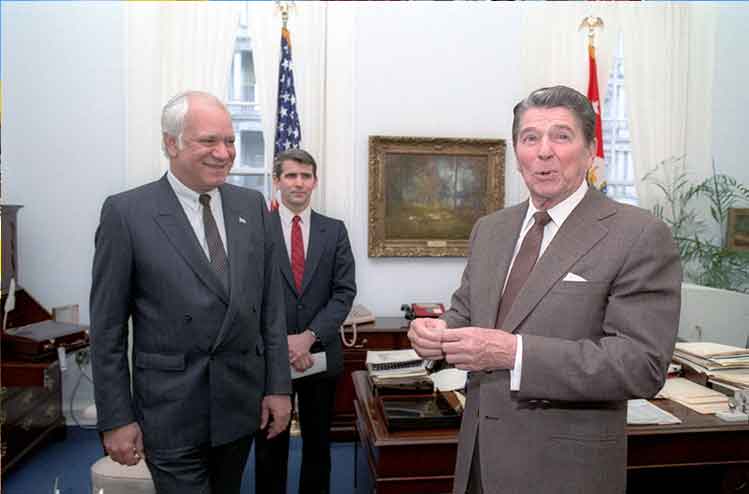Iran Contra Affair

President Reagan in Robert McFarlane's office with Adolfo Calero, a Nicaraguan Democratic Resistance (Contra) leader, and Oliver North. 4/4/85
The United States secretly sold weapons to Iran which it was publicly boycotting. It used the money to support the Contra guerillas in Honduras who were battling the Sandinist government in Nicaragua. Supporting the Contras violated US law. In November 1985 the whole affair came to light.
When Iran had stormed the American Embassy in Teheran and took American diplomats hostage the United States imposed an arms embargo on Iran. When Iraq invaded Iran in 1980, the Iranians became desperate to obtain spare parts for their American equipped armed forces. The Defense Department had concluded that the embargo was not working and would force Iran into Soviet arms. Despite that report, the US launched a worldwide program called Operation Staunch to stop counties throughout the world from selling weapons to Iran.
At the same time, the Contras were waging war in Nicaragua against the Sandinista government which was very left. The Reagan Administration had made it their priority to try to topple the Sandinista government. The Congress, however, did not support helping Sandinista and had passed the Boland Amendment. It first limited and then cut off all funding to the Sandinistas.
The exact date of when the US started supplying arms to the Iranians has remained a question of dispute, but by 1985 the US was both directly and through Israel selling weapons to the Iranians. The sales were used as leverage to obtain the release of Americans held Lebanon. The point man on the project was Colonel Oliver North who worked on the National Security Council. The money from the secret sales was used to fund the contras operating in Honduras against the Nicaraguan Government.
The Lebanese magazine Ash-Shiraa first discovered the sale of the arms to Iran on November 3rd. When an airlift of guns to Honduras was downed over Nicaragua, the other side of the story came out. The Iranians confirmed the story. President Reagan appeared on national television on November 13, 1985, and said:
My purpose was ... to send a signal that the United States was prepared to replace the animosity between [the U.S. and Iran] with a new relationship ... At the same time, we undertook this initiative, we made clear that Iran must oppose all forms of international terrorism as a condition of progress in our relationship. The most significant step which Iran could take, we indicated, would be to use its influence in Lebanon to secure the release of all hostages held there.
After a Congressional investigation, a long list of people was indicted for their parts in the affair. President H W Bush pardoned all.
